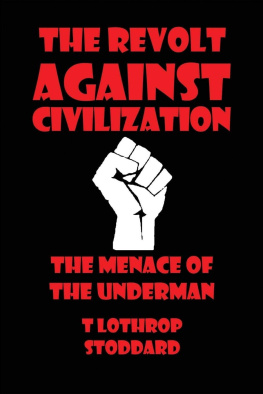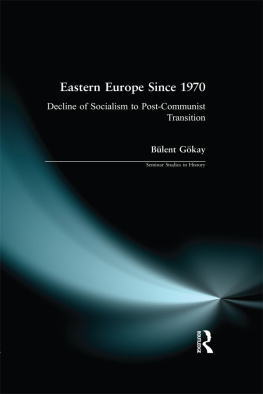
The Revolt
Against
Civilization
The Menace of the Under Man
By Lothrop Stoddard, A.M., PH.D (Harvard) Copyright 1922, Charles Scribners Sons
PREFACE
THE revolutionary unrest which to-day afflicts the entire world goes far deeper than is generally supposed. Its root-cause is not Russian Bolshevik propaganda, not the late war, not the French Revolution, but a process of racial impoverishment, which destroyed the great civilizations of the past and which threatens to destroy our own. This grim blight of civilized society has been correctly diagnosed only in recent years. The momentous biological discoveries of the past generation have revealed the true workings of those hitherto mysterious laws of life on which, in the last analysis, all human activity depends. In the light of these biological discoveries, confirmed and amplified by investigations in other fields of science, especially psychology, all political and social problems need to be re-examined.
Such a re-examination of one of these problemsthe problem of social revolutionhas been attempted in the present book. LOTHROP
STODDARD BROOKLINE, MASSACHUSETTS, March 30, 1922
CHAPTER ITHE BURDEN OF CIVILIZATION
CIVILIZATION is the flowering of the human species. It is both a recent and a fragile thing. The first glimmering of genuine civilization appeared only eight or ten thousand years ago. This might seem a long time. It does not seem so long when we remember that behind civilizations dawn lies a vast night of barbarism, of savagery, of bestiality, estimated at half a million years, since the ape-man shambled forth from the steaming murk of tropical forests, and, scowling and blinking, raised his eyes to the stars.
Civilization is complex. It involves the existence of human communities characterized by political and social organization; dominating and utilizing natural forces; adapting themselves to the new man-made environment thereby created; possessing knowledge, refinement, arts, and sciences; and (last, but emphatically not least) composed of individuals capable of sustaining this elaborate complex
and of handing it on to a capable posterity.
This last consideration is, in fact, the crux of the whole matter; the secret of success, the secret, likewise, of those tragic failures which perplex and sadden the student of history. Mans march athwart the ages has been, not a steady advance, but rather a slow wandering, now breasting sunlit heights, yet anon plunging into dank swamps and gloomy valleys. Of the countless tribes of men, many have perished utterly while others have stopped by the wayside, apparently incapable of going forward, and have either vegetated or sunk into decadence. Mans trail is littered with the wrecks of dead civilizations and dotted with the graves of promising peoples stricken by an untimely end.
Sharp and insistent comes the query: Why? Civilization seems so good a thing! It means relative protection from the blind and cruel forces of nature; abolition of the struggle against savage beasts and amelioration of the struggle between men; opportunity for comfort, leisure, and the development of the higher faculties. Why, then, do we find so many branches of the human species never attainingnever really striving afterthese eminently desirable boons? Also (yet more noteworthy!) why do we find still other stocks, after having attained civilization, losing it and falling back to the lower levels of barbarism or even of savagery?
Mysterious though this may at first sight appear, there is, nevertheless, an answer: Those stagnant or decadent peoples could not bear the burden of civilization. For civilization is a burden as well as a benefit.
This is inevitable in a universe governed by laws which decree that something may not come out of nothing. Civilization is not a cause but an effectthe effect of sustained human energy; and this energy, in turn, springs from the creative urge of superior germ-plasm.
Civilization is thus fundamentally conditioned by race. In any particular people, civilization will progress just so far as that people has the capacity to further it and the ability to bear the correlative burden which it entails. When this crucial point is reached, the civilization of that people either stagnates or retrogrades. Exactly how
the process works becomes clear by a glance at human history.
When the ape-man emerged from utter animality, he emerged with empty hands and an almost empty head. Ever since that far-off day, man has been filling both hands and headhis hands with tools, his head with ideas. But the filling has proceeded most unequally, because capacity has varied greatly among the different branches of mankind.
Whether all human varieties spring from a single original stock we do not know. What we do know is that the human species early appears divided into a number of different varieties contrasting markedly both in physical features and mental capacities. Thus differentiated and ever further differentiating, mankind plodded the long, long trail leading from bestiality to savagery, from savagery to barbarism, and from barbarism to civilization. Slowly the empty hands and heads began to fill. The hands grasped chance sticks and stones, then trimmed clubs and chipped flints, then a combination of the twain.
These same hands presently fashioned the skins of beasts to clothe the bodys nakedness against the cold, kindled fires for warmth and roasted food, modeled clay for pottery, tamed wild creatures into domestic animals. And behind the hand was the brain, not merely making these purely material inventions but also discovering others of a higher order, like speech or even non-material concepts from which sprang the rudiments of social and political existence. All this occurred while man was still a savage. With the next stagebarbarismcame fresh discoveries, like agriculture and the smelting of metals, together with a variety of new ideas (especially the momentous art of writing), which brought mankind to the threshold of civilization.
Now, it is obvious that at this stage of his development man was a vastly different creature from the bestial being of earlier times.
Starting from naked destitution and brutish ignorance, man had gradually gathered to himself an increasing mass of tools, possessions, and ideas. This made life much more comfortable and agreeable. But it also made life much more complex. Such a life required vastly more effort, intelligence, and character than had the instinctive, animal existence of primeval days. In other words, long before the dawn of
true civilization, the burden of progress had begun to weigh upon mankind.
Indeed, even the first light burdens had in some cases proved too heavy to be borne. Not all branches of the human species attained the threshold of civilization. Some, indeed, never reached even the limits of savagery. Existing survivals of low-type savage man, such as the Bushmen of South Africa and the Australian Black-fellows, have vegetated for countless ages in primeval squalor and seem incapable of rising even to the level of barbarism, much less to that of civilization. It is fortunate for the future of mankind that most of these survivals from the remote past are to-day on the verge of extinction. Their persistence and possible incorporation into higher stocks would produce the most depressive and retrogressive results.
Much more serious is the problem presented by those far more numerous stocks, which, while transcending the plane of mere savagery, have stopped at some level of barbarism. Not only have these stocks never originated a civilization themselves, but they seem constitutionally incapable of assimilating the civilization of others.
Next page









